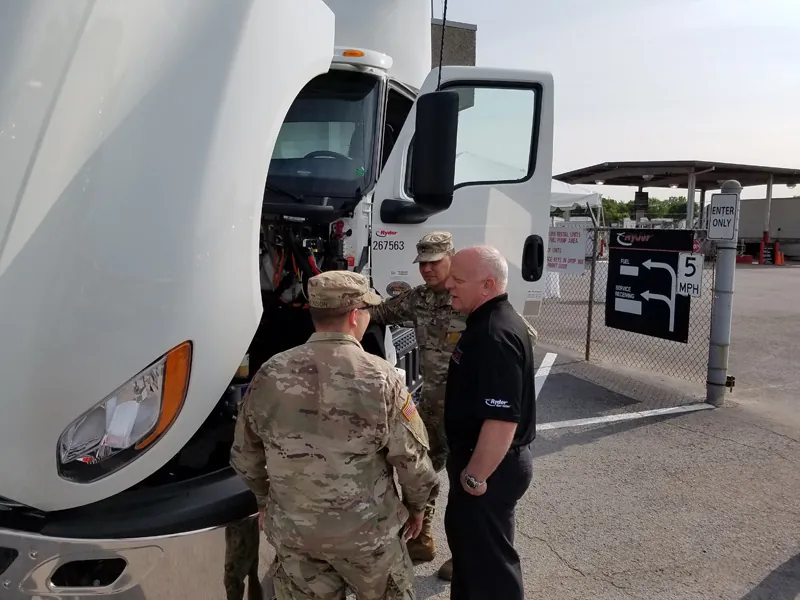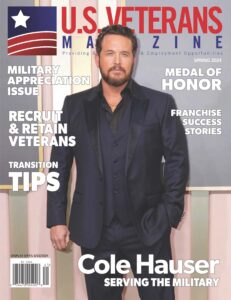By Todd Skiles
My service in the military was rewarding and invaluable to my development not only as a professional but as a man and an American. It gave me life lessons, a support system and an inner strength that few experiences could replicate.
Returning from active duty can feel a bit like starting back at square one. But if you understand how your time in the military sets you ahead of the pack, you can go from strength to strength in your transition to civilian life. In the corporate world, veterans have the skills that are needed across different fields and industries.
When I first stepped into a management trainee role with Ryder System, Inc., I never expected it would evolve into a successful career in logistics and transportation solutions spanning decades at the company. Over the years, I’ve learned tips and strategies that I believe each transitioning serviceman or -woman can use to set them on the path to success.
Plans are useless, but planning is indispensable
No plan survives first contact with the enemy. But in civilian life, no plan survives the opportunities and challenges of finding a job, a house, a car or obtaining further education. That’s why preparation — learning about your options and taking stock of your military career — can position you to handle whatever life throws at you.
Before you even begin to think about signing your discharge papers, you should familiarize yourself with the vast array of resources for transitioning servicemen and -women. One example is the Transition Assistance Program the Department of Veterans Affairs offers. Your post-military support system is extensive. From the Hiring Our Heroes Corporate Fellowship Program to the hundreds of private sector initiatives that recruit and train veterans to the totality of your VA education and training benefits, understanding your unique opportunities is the first step toward success.
Ryder’s Pathway Home program is another great example: The 12-week technician training course gives participating soldiers hands-on diesel technician training during their final days of service. Service members who complete the program are offered employment.
Next, you should take the time to lay out everything you’ve accomplished in your service career — basic training, any courses and certificates, your awards or recognition, plus any deployments or missions you’ve been a part of. It may be helpful to put each experience on its own notecard. On the back, write the names of commanders or teammates you worked alongside, their contact information and a list of the skills or qualities you demonstrated in that experience.
Taking stock of your service career can help you determine your strengths, weaknesses, interests and skills. It may also help you understand where you can provide unique value in the civilian workforce. Most importantly, it may help you tell your story to prospective employers. Watch how quickly your cover letters write themselves!
Know your worth and your values
As you begin your job search, do not underestimate the qualities you convey through your military service. Even values as fundamental as honor and trustworthiness can be worth their weight in gold to prospective employers. In my role in sales and solutions, for instance, my military service translated to confidence in my ability to engage with people honestly, in good faith and with my full commitment to their success.
With sought-after attributes like loyalty, dependability, leadership, teamwork, attention to deadlines and detail, and the ability to make critical decisions under pressure, employers recognize that veterans are an immense asset to their teams. And for veterans, I also think it’s essential to search for and find the right culture that values the same things we value.
My military training served as a springboard in my development as a leader, enabling me to rise through sales and sales leadership positions within Ryder over the past 34 years. Today, I report directly to the president of our division and our chief sales officer with sales goals of just under half a billion dollars and a team of 100 sales professionals and support staff in three countries.
The key is understanding your unique value and the tangible and intangible skills you can leverage in the next phase of your life. That’s why I always urge veterans to think outside the borders of their military occupational specialty (MOS) beyond their direct experience and help their prospective employer understand their immeasurable worth as part of their team.
The only easy day was yesterday
Taking that first job, that first class, that first mentorship opportunity after your service can be daunting. Will the opportunity meet your expectations? Will people relate to you?
The unity and camaraderie of military service do not have to end when you step into civilian life: I encourage you to seek out opportunities where you can have a shared sense of purpose with your team and your employer. Many companies have veterans-only resource groups, trainee classes, as well as group chats and Slack channels where you can ask questions and get advice. Ryder, for instance, has a Veteran Buddy program that pairs veterans already employed at the company with new veteran hires. This adds a layer of support that can help ease the onboarding process and transition to civilian life.
When I was 26 and serving in Desert Storm as a company commander in a war zone, I was ordered to pull together resources from all five units in my battalion and lead a convoy of over 200 transportation assets through Iraq. Although I look more like a PowerPoint Ranger these days, traveling between warehouses, customer locations and Ryder logistics centers, my fundamental mission to serve people hasn’t wavered. You may find that you, too, can carry that purpose into civilian life.
Todd Skiles is the Senior Vice President of Sales for Supply Chain Solutions (SCS) and Dedicated Transportation Solutions (DTS) at Ryder System, Inc., focused on matching Ryder’s solutions with the real and vital needs of customers. Todd is responsible for overseeing the sales and solutions team for SCS and DTS. Under his leadership, sales revenue has grown by more than 130% and sales productivity has doubled.



